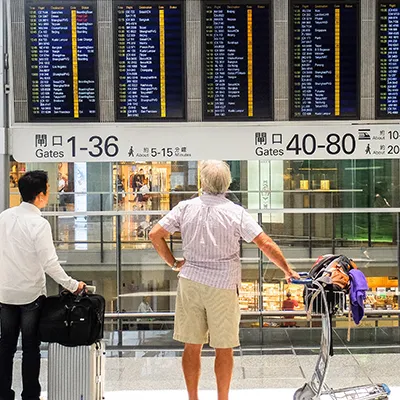Should You Buy Trip Insurance from an Airline?
Becky Hart | Mar 25, 2024

We’re all for making travel easy. We also understand that some of the most complicated parts of travel come during the planning stages. How do you find the best airfare? Do you need travel insurance? Where do you go to get the right coverage? What does all that fine print even mean? When things get tough, it’s tempting to choose whatever is most convenient. The downside of this, however, is that what’s easiest isn’t always what’s best in the long run.
Airlines try to make it easy to buy travel insurance when you purchase your ticket. It’s often a quick click of a button to add the plan to the price of your airfare. Before you click that button, though, answer this all-important question: should you buy trip insurance from an airline?
Where Should You Get Travel Insurance for Flights?

As you decide whether to buy trip protection from an airline or a travel insurance provider like Seven Corners, there are four key considerations to keep in mind. This will help you get the right coverage for your trip at a price that makes sense.
1. Compare apples to apples.
There is a range of trip protection plans out there. Even when they have similar names, the specifics of each plan can differ greatly.
If you’re a price shopper and decide to compare the cost of the airline’s insurance with what you’d get from another company, dig a little deeper than simply plugging in your trip details and looking at the total cost. One plan could have a lower price, but you still want to look at what’s included in — and excluded from — that plan. You might find that the price is low for a reason. It might not have the same benefits or levels of coverage as the more expensive option and, therefore, not provide you with what you need.
Here’s an example. We compared quotes for trip protection from an airline (which shall remain nameless) versus Seven Corners. The trip details were the same: an Indiana resident traveling to California for a month where I’d need rental car coverage and protection for $1,000 in prepaid, nonrefundable trip expenses.
The airline insurance was initially more expensive, but it didn’t include any coverage for rental car damage, even as an add-on. Seven Corners Trip Protection, on the other hand, has optional rental car damage coverage. While adding this benefit did make it more expensive, it still provided the coverage I needed for my trip, likely making it a smarter purchase.
Additionally, the levels of medical coverage from the airline were significantly lower than what was available through Seven Corners. The airline’s plan, for example, covered emergency medical expenses up to just $10,000 compared to $100,000 for Seven Corners Trip Protection Basic plan and $500,000 for Seven Corners Trip Protection Choice.
Now you could decide that less medical coverage is acceptable for you, in which case, the airline’s insurance might be what you choose. Our point is that it’s important to know what you’re comparing and understand that just because both are labeled “trip protection,” they are not necessarily the same.
2. Get the best value for your money.
This leads nicely to a comparison of cost versus value. Cost is the price of an item or service. Value is the subjective importance you place on that item or service. For example, I have a friend who loves shoes. She would not flinch at spending $200 on a new pair. For her, pretty shoes have high value. I, however, couldn't care less about footwear. The same pair of shoes has lower value for me even though it still costs $200.
Don’t confuse price with value. If the airline’s insurance is less expensive but it doesn’t include all the coverage you need, it’s not a good value, regardless of the cost.
3. Take advantage of options.
Sometimes we have unique needs or specific benefits we're looking for in a trip protection plan. Keep in mind that just because an airline’s insurance doesn’t have a benefit, that doesn’t mean you can’t get the benefit somewhere else.
Some airlines offer one trip protection plan only, regardless of who you are and what you need. At Seven Corners, we know all travelers are unique, which is why we offer a range of plans. You can also customize most Seven Corners travel insurance by adding optional benefits or choosing the levels of coverage that meet your needs.
Cancel for Any Reason (CFAR) and Interruption for Any Reason (IFAR) are optional benefits that you may not see with travel insurance from an airline. You can add these benefits to a Seven Corners Trip Protection plan, however. This is ideal for travelers who want more flexibility to change their itinerary for reasons other than those listed in the typical trip protection plan document.
Don’t settle for a plan that isn’t right for you just because that’s all you see on one screen.
4. Choose a company you can trust.
Just as you want to choose the right coverage for your trip, you might want greater flexibility in choosing the company that provides that coverage. Delta, American Airlines, and JetBlue, for example, all partner with the same travel insurance provider. If you prefer a different company or want more options, you’re better off skipping the airline’s travel insurance offering and shopping around.
To find the right travel insurance provider for you, pay attention to things like customer service and expertise. Insurance companies can offer resources and support to make your experience hassle-free. They’re in a stronger position to provide this compared to airlines, who are in the business of flying, not travel insurance.
Seven Corners has a wealth of resources to help you get the right coverage, from blogs like this one to short videos explaining benefits, to 24/7 customer service and licensed agents ready to answer any and every question you have about coverage. We’ve spent 30 years perfecting the business of serving travelers like you so that you can trust us with your peace of mind.
Read More >> 4 Frequently Overlooked Tips for Buying Travel Insurance
Is Travel Insurance Better than Refundable Airline Tickets?
There are pros and cons of buying refundable airline tickets. A refundable ticket may be less expensive than travel insurance, but travel insurance may offer more robust protection for a greater number of scenarios. Before choosing, find out more about how to decide if refundable airline tickets or flight insurance are better for you.
It’s important to note that if your airfare is refundable, you will not include it in your trip costs when purchasing travel insurance. Learn more about how to calculate trip cost for trip insurance so that you get the right amount of coverage.
Choose Seven Corners Trip Protection for Your Next Flight.
One of the advantages of buying travel insurance from a provider like Seven Corners is that you get expert knowledge and support, starting before you buy protection all the way until you return home. Our licensed agents are ready to answer any of your questions, and our travel assistance team is available 24/7 in case you run into an emergency during your trip.
See what Seven Corners has to offer you, and contact us when you’re ready to protect the money you invest in your trip.
Email sales@sevencorners.com
Toll free 1-800-335-0611
Worldwide 317-575-2652
Collect 317-818-2809
Travel Like a Pro with The Wayfinder
Did you enjoy this blog? Get more articles like it before anyone else when you subscribe to our monthly newsletter, The Wayfinder.
Search Posts
Receive our monthly inspiration and travel tips from the travel insurance experts.
Sign me upThis website and various social media updates provided by Seven Corners contain content, information, articles, videos, and links to websites created by third parties. Seven Corners, its owners, and its employees neither endorse nor are responsible for the accuracy, timeliness, or reliability of any third-party information, statements, opinions, or advice and are not liable for any loss, harm, or damage caused by your reliance upon them. Use of such information or the linked websites is entirely at your risk. Concerns regarding this third-party content should be directed to the third party. Seek professional advice, as appropriate, regarding your use of such information and websites.
Because the information on this website and in Seven Corners’ blogs and other social media is written and compiled using knowledge and information available at a certain point in time, it may become outdated. For that reason, information, events, legal requirements, and product changes (including benefits, limitations, exclusions, and services) may not be up-to-date, complete, or accurate at the point in time it is being read. Again, use of such information is at your risk.
